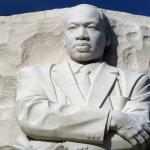To the young white man who asked me, “Dr. Gibson, where did you get your eloquence?”
I am writing you here, as I am afraid I was unable to be completely honest in the moment in which you posed the question. You see, I have mastered the art of taming my rage, of offering it in such a way that it would not be disruptive. I suppose we might say that it too has an eloquence about it, that it strikes and grabs without bruising, that it touches without a trace. And yet, I am compelled to offer a bit more to the question, as it is one I have received in some iteration for most of my life. Despite this familiarity, I am always puzzled, always caught off guard, for it comes with presuppositions to which I would rather not submit. But here we are, or there we were…
To the question, I am most immediately drawn to the rhetoric of place and retrieval – the “where” and the “get.” When you ask from “where did I get it,” you suppose that eloquence is something that must be gotten, must be retrieved from some foreign place; presuming that it is not something which I might naturally own, that I might locate within myself. If I must answer, and cannot center myself in doing so, as both original possessor and site of possession, then perhaps I might say this: I got my eloquence through a dark bloodline. My great, great, great grandfather stole this eloquence from his master’s tongue. In the silence that slavery gifted him, and understanding how the white world imagined his tongue unfit to hold language so perfectly, he stole it. Stole it back to be precise. You see, his master’s eloquence was a stolen thing itself, something his master’s great, great grandfather stole from his. So, my bloodline stole it back. Planted it beneath their tongues and allowed it to germinate within the darkness of suffering. At night, they would steal off into the woods and the swamp and allow their tongues to stretch into scripted sound… I imagine that eloquence was the phonics of freedom. And since we have always longed to be free, it made sense that when we spoke most authentically, under the cover of night, that it would be… eloquent.
I got my eloquence through a dark bloodline. My great, great grandmother stole it from the white woman whose clothes she washed. She stole it back, to be precise. Tucked it into her apron and fed it to her children when she got home. Her eloquence was gentle, like a whisper, like the wisdom of black women who are creative in spaces of lack. I got my eloquence through a dark bloodline, through my silver-haired grandfather whose voice I never heard, through the religiosity of my grandmother who wove bayou in my blood; they bore southern trickster into my speech.
If eloquence is indeed noted for its fluidity, does it not make sense that black folk be eloquent? Have we forgotten how black folk hold this quiet relationship with water, how we have been forced to fold ourselves into its folds, to breathe without drowning? I suppose that eloquence comes from those places, something about that dark bloodline, something about the water. I hear they don’t sell eloquence like that anymore, but then again, we are in the South and you are asking me this question…
When I turned away from that genuine young white man, I swallowed a bit. I wanted to be sure that I did not allow all of my eloquence to escape. At some point, I’ll need to share it with other black folk, quietly, in the still of the night. I will tell them, “Somebody tried to steal our tongue again… But I kept mine,” I’ll say, “I still have mine…”
Ernest L. Gibson III is an Assistant Professor of English at Rhodes College in Memphis, Tennessee. His teaching and research interests include African American Literature, Male Studies, Black Popular Culture and Literary/Cultural Theory.
Donate to the Work of R3
Like the work we do at Rhetoric Race and Religion? Please consider helping us continue to do this work. All donations are tax-deductible through Gifts of Life Ministries/G’Life Outreach, a 501(c)(3) tax-exempt organization, and our fiscal sponsor. Any donation helps. Just click here to support our work.













